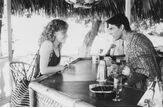In the film, someone asked the old painter: "How do you catch what you want to paint?" The old painter was holding a dead fish in his hand at this time. While looking at the dead fish over and over, he replied, "That's right. The moment when something extremely familiar to you suddenly becomes unfamiliar." In 1933, Tanizaki Junichiro published a short article in which he said that he felt sorry for the shadow. The more this regret is inferred in a provocative way, the more heartbreaking it is. Tanizaki Junichiro said: He regrets writing brushes that are not as loud as a fountain pen; tarnished metal objects; opaque crystals and fuzzy jade; smoke streaks on bricks; paint spots on wood; signs of bad weather; broken branches , Wrinkles, scattered piping, heavy breasts; remnants of birds left on the railing; a candle lit for dinner, or a flickering remark from a lantern hung on a wooden door, quiet Insufficient shimmer; he regrets that because the mind is closer to the boundary of the teeth, when the human mind is wrapped in the shadow, more free or slower or swaying thoughts rise from the human mind; more For a deep and hesitant voice, it is accompanied by the spark of the cigarette, and his eyes fall on the butt of the cigarette; as people get older, the more and more lasting taste of what has been eaten, and the shape and color of the food , The feeling of becoming less and less obsessive... He likes the half-openness of tea leaves in its hot liquid world; and the small curled leaves that are silky before mixing with the water. The overcast color that spreads out and is scattered in the water; and the reddish color that is gradually hidden in the bottom of the porcelain cup, which in some respects looks like autumnal residue; he likes to be with darkness and darkness The added floating infinitely connected deep secluded hiding place; He said that the density of thought in the dark is particularly close to the intensity of excitement and embarrassment... In the text, Tanizaki Junichiro expresses those who are no longer part of Japanese society. The place he tolerated even expressed his nostalgia for the almost gloomy toilets in ancient Japan. A nun asked Mr. Saint Seron if what she said in her prayers was useful, and he replied: Useless. People are just some dolls, and our lives are prison cells. When we master the language, we build ruins among the dead leaves and moss. "Dead leaf" is feuille morte in French, and feuille can also refer to paper. The compound word feuille morte, literally translated, means "dead paper". In this sense, art is the smallest leaf that is most difficult to detect and capture. It is the remnant nature under cultural planting. It lurks in the tiniest, off-white gum at the end of spring branches that change throughout the seasons. Japanese "Youxuan" literature seeks to be among the dead branches and leaves, but also to bloom beautiful flowers. This is the kind of thing that Japanese souls are nostalgic for. The last two sentences of Han Yu's "Mountain Rock": "Well, my party's second and third sons, I will never return home in peace." I hope that I, and my shadow, will walk together with another person, and the three of us live together. I don't know the old generals. to. I am willing to be bored as a company, as a friend, as a teacher, and as a spouse. Even bored, bored with love, bored with praise, bored with obsession, bored with worship.
View more about Cocktail reviews










